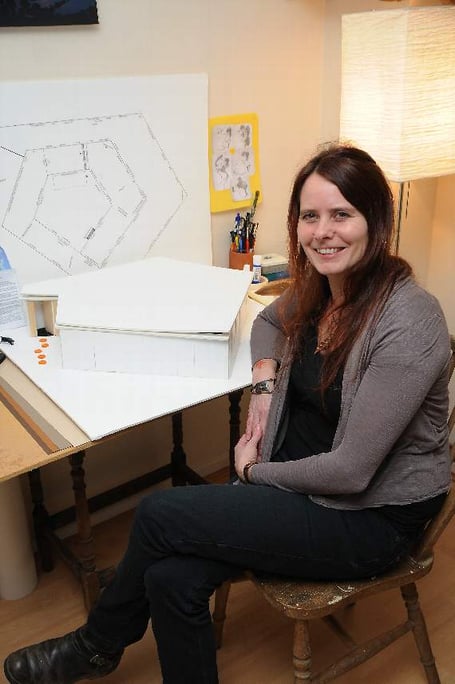AN invitation to “open the door to a room of a thousand demons” may not make you immediately want to accept, and perhaps neither would a second invitation to “enter the Labyrinth and greet your minotaur”.
However, although both may sound daunting, they have been devised by Polly Ravenscroft, who lives in Selborne, to take people on an emotional journey, designed to help them confront fears and emotions they have long hidden or face a need to change something within themselves.
As they walk through the soothing, healing labyrinth they will have the chance, in its calm atmosphere, to take time to think about things that have been troubling them but which they have never been sure how to deal with.
Polly said: “Some (people) simply bury them under the carpet.”
She added that she wanted to help people by enabling them to step out, ready to face life, and make changes they did not have the courage to do before, and to feel alive.
When Polly gets the £30,000 she needs to build the Labyrinth, a walk-in art installation, it will be an 11-metre by 11-metre building, with a strong outer wall built of doors and with passages inside studded with artwork that will help awaken senses and re-kindle repressed memory.
The passages will lead to a centre chamber in the building, where a person will have time to contemplate the difficulties they may be facing and the challenges they have been too frightened to meet, and reflecting on their life in general or on death.
It is hoped that a healing process will take place, with the shaking off of the negative emotional restraints that have been holding them back.
Polly, who holds a diploma in counselling, has already tested a “skeletal model” of the labyrinth at Blackmoor Apple Day and said she got a positive reaction from everyone who walked around the open-air maze built with pallets and hung with willow.
They had, she found, felt a peace to explore their feelings and to look at how they can make their lives more positive and exciting – exactly what she is setting out to achieve.
“The Labyrinth is all about honouring the emotional journeys that we take,” she said.
“The challenges, the difficulties, the obstacles, the glorious moments, the mountain tops and the mundane, the highs and the lows, the ups and the downs, and the OK times in the middle.
“The deeper we feel, the richer our emotional experiencing is and the more alive we become.
“The Labyrinth is for anyone interested in the mind, in art, in art as an expression of self, and for those who have a feeling they wish to change something within or themselves.
“It is for igniting curiosity and excitement for emotional exploration – in other words, losing the shame and the fear.”
With the reaction she got from the first trial at Blackmoor, Polly is even more determined to build a permanent labyrinth, with stepping stones leading to the entrance, by 2018.
“It will be free to enter and ideally I would like it built inside a large barn, in a field, and it will have exit doors and be disabled-people friendly.
“But the majority of visitors will have to climb a ladder and go down a slide to get out.
“I would like them to come out into a beautiful garden and I will build workshops on the perimeter to help with further study and exploration of how to deal with the emotional journey we take through life.”
It might be easy to dismiss it as a “pie in the sky” dream by someone who may not have had the same experience as Polly of helping people.
But Polly, at 47, is well qualified to understand people’s emotions, and the difficulties, and sometimes the horrors, they face and how to help them.
She is a trained counsellor with her own private practice, and for the past eight years she has worked for the staff counselling service at Queen Alexandra Hospital in Cosham, and as a volunteer for the Portsmouth Abuse and Rape Counselling Service.
Many of the victims suffer deep trauma and tend to feel shame about what has happened to them, with some blaming themselves.
Because of what they have experienced and the trauma they are still going through, Polly said: “Many have lost the way, as have people who experience setbacks and fears in their lives.
“By talking about what they have experienced or what life has dealt them, it helps them to work their way through, ready to feel alive again.
“It can be frightening having to face your fears and that is why you need someone who will listen to you.
“It is most important that the person who is talking about their problems knows that the person they are talking to is listening.”
Polly now lives in a house not far from the village home in which she grew up and near where she went to primary school before studying at Eggar’s School in Alton and then Alton College.
She had a desire to see and meet people from around the world and so for 10 years she travelled in Israel, Egypt and Asia and Tibet, which was to have a great influence on her.
It was on these travels that she learned of the legend of the Room of a Thousand Demons, which told the story of how in bygone monasteries the monks were challenged to enter a room, said to contain demons, and the only way out was to walk through the room and confront their demons.
This also led to Polly being inspired by the Greek legend of the minotaur, half-man half-bull beast, living in a labyrinth killing anyone who dared to enter until Ariadne and Theseus overcame fear and braved the maze of corridors to kill the beast.
Polly gained a lot of experience with people and their emotions and behaviour on her travels and, returning to England, she decided to become a counsellor to help people in this country. After studying at Alton College, she gained her diploma at Guildford College. After qualifying, she worked extensively with young people, spending five years with Havant Bereavement, helping children to deal with their grief after the loss of a parent.
As well as her volunteer work, Polly, who has an 18-year-old daughter, Olivia, also has her own private counselling practice and what little time she has is now taken up with building the Labyrinth. She plans to fund herself the first £5,000 and to raise £5,000 through a ‘sponsor a door’ campaign. The outside of the Labyrinth will consist of 94 doors all painted white, with £54 being the fee to sponsor a door. Polly is also applying for an Arts Council grant of £20,000 and wants to complete the work by 2018.
“I know I will do it,” she said.
Polly plans to take her skeletal Labyrinth to the Beltain Festival at Butser Hill on March 30, returning to Butser Hill again on May 2.
Visit thelabyrinth.uk. To donate, e-mail [email protected].





Comments
This article has no comments yet. Be the first to leave a comment.